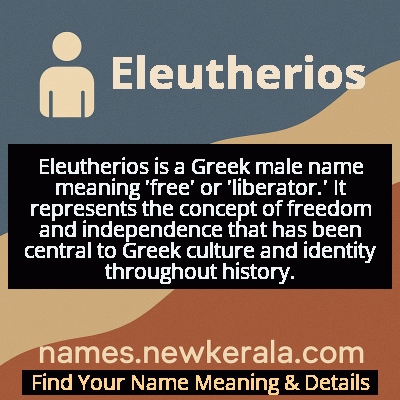Eleutherios Name Meaning & Details
Origin, Popularity, Numerology Analysis & Name Meaning of Eleutherios
Discover the origin, meaning, and cultural significance of the name ELEUTHERIOS. Delve into its historical roots and explore the lasting impact it has had on communities and traditions.
Name
Eleutherios
Gender
Male
Origin
Greek
Lucky Number
2
Meaning of the Name - Eleutherios
Eleutherios is a Greek male name meaning 'free' or 'liberator.' It represents the concept of freedom and independence that has been central to Greek culture and identity throughout history.
Eleutherios - Complete Numerology Analysis
Your Numerology Number
Based on Pythagorean Numerology System
Ruling Planet
Moon
Positive Nature
Diplomatic, friendly, artistic, empathetic.
Negative Traits
Over-sensitive, moody, indecisive, prone to self-pity.
Lucky Colours
Green, cream, white.
Lucky Days
Monday.
Lucky Stones
Pearl, moonstone.
Harmony Numbers
1, 3, 4.
Best Suited Professions
Diplomats, mediators, caregivers, artists.
What People Like About You
Cooperative spirit, friendliness, artistic talent.
Famous People Named Eleutherios
Eleutherios of Byzantium
Religious Leader
Early Christian bishop of Byzantium who helped establish the church in the region before it became Constantinople
Eleutherios Venizelos
Statesman
Influential Greek politician who served as Prime Minister multiple times and played a key role in modern Greek politics
Saint Eleutherios
Religious Martyr
Early Christian saint and martyr who was bishop of Illyricum and known for his missionary work
Eleutherios Papadimitriou
Academic
Prominent Greek historian and scholar specializing in Byzantine studies and Greek cultural history
Name Variations & International Equivalents
Click on blue names to explore their detailed meanings. Gray names with will be available soon.
Cultural & Historical Significance
During the Byzantine era, the name maintained its popularity among Christian communities, with several saints bearing the name, thus bridging the classical and Christian traditions in Greek culture. The name's enduring presence across millennia demonstrates how core cultural values can persist through religious and political transformations. In modern times, the name continues to represent Greek national identity and the historical struggle for independence, particularly during the Greek War of Independence against Ottoman rule.
Extended Personality Analysis
Individuals named Eleutherios are often perceived as possessing strong leadership qualities and an innate sense of justice. They tend to be independent thinkers who value personal freedom and autonomy, both for themselves and others. This name carries expectations of courage and principled stands, with many Eleutherios figures throughout history being remembered for their willingness to challenge oppression or conventional thinking. They are typically seen as visionary and forward-thinking, often championing progressive ideas or social reforms.
The name suggests someone with natural authority who inspires confidence in others, combined with a deep sense of responsibility toward community and societal welfare. Their strong moral compass and commitment to ethical principles often make them natural advocates for those without voice or power. While they can be determined and sometimes stubborn in their convictions, they are generally respected for their integrity and willingness to fight for what they believe is right, even when facing significant opposition or personal risk.
Modern Usage & Popularity
In contemporary Greece, Eleutherios remains a respected traditional name, though its usage has declined in favor of more modern names. It is most commonly found among older generations and in rural areas where traditional naming practices persist. The shortened form 'Lefteris' is much more common in daily use, serving as the familiar version of Eleutherios. The name experiences occasional revivals during periods of national significance or among families with strong connections to Greek history and traditions. While not among the most popular names for newborns in urban centers, it maintains a steady presence and carries connotations of heritage, dignity, and cultural continuity. In the Greek diaspora, the name serves as a marker of cultural identity and connection to Greek heritage.
Symbolic & Spiritual Meanings
Eleutherios symbolizes the eternal human aspiration for freedom, autonomy, and self-determination. Beyond its literal meaning of 'free,' the name represents liberation from various forms of constraint - whether political, social, intellectual, or spiritual. It embodies the concept of eleutheria as understood in Greek philosophy: not merely freedom from external control, but the capacity for self-governance and moral autonomy. The name carries connotations of breaking chains, overcoming limitations, and the courage required to stand against oppression. In a broader sense, it represents the human spirit's relentless pursuit of truth, justice, and the right to determine one's own destiny, making it a powerful symbolic name across cultures that value individual rights and collective freedom. The name serves as a reminder that true freedom involves both external liberty and internal self-mastery.

